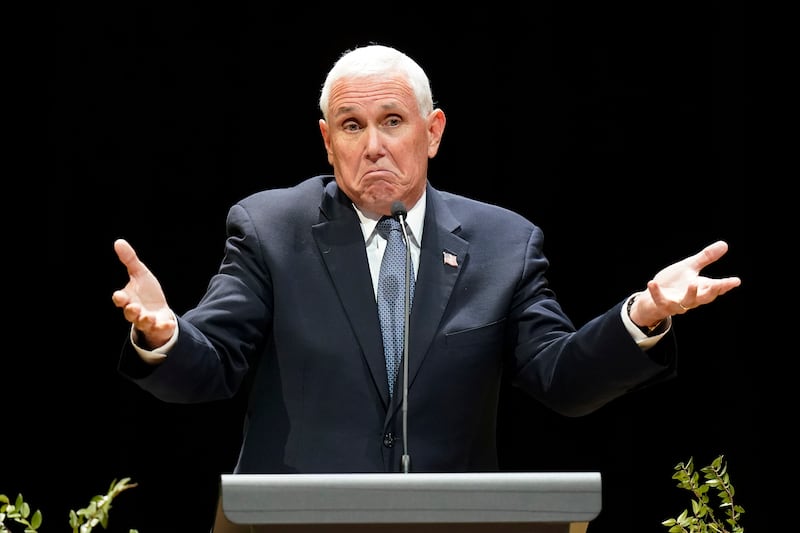The U.S. Senate race between incumbent Mike Lee and challenger Evan McMullin continues to generate arguments among politicos as to campaign strategy. The current debate is whether the endorsements from famous politicians and others are meaningless or helpful in this contest. Since we seem to have opinions (often wrong) on most everything, we offer our perspectives.
Former Vice President Mike Pence, Utah’s congressional delegation (minus Sen. Mitt Romney) and many local elected Republicans have endorsed Lee. Former Congressman Ben McAdams, Salt Lake County Mayor Jenny Wilson, Former National Democratic Chairman Howard Dean, former National Republican Chairman Michael Steele, and a lot of local folks, advocate for McMullin. The dueling endorsements are significant, but will they make a difference?
Pignanelli: “I think celebrity endorsements hurt politicians.” — Kid Rock
Campaign endorsements are usually considered similar to the parsley garnish on a dinner plate. They beautify the dining presentment yet are seldom consumed and enjoyed. But the traditional perspective may be suspended in the current unusual election season.
Lee, while ahead in most polls, is taking nothing for granted among the undecided portions of the Republican base. Thus the endorsements from Pence and local elected officials to deflect attacks by McMullin. They provide comfort to moderate Republicans that Lee is important to their agenda.
Utah Democrats would not have thrown their support to McMullin without early endorsements from McAdams and Wilson. Dean helps solidify lefty voters but could antagonize others. Also, numerous self-categorized Republicans submitted pro-McMullin editorials. But an inability to garner high profile local GOP officials reveals a weakness in McMullin’s coalition and magnifies his continuing lack of definition. These omissions are amplified by the advertisements Lee is broadcasting with the various mayors supporting him.
In 2022, endorsements are more than just decorating the dinner, but likely adding protein to solidify Lee’s lead.
Webb: Endorsements don’t make or break a candidacy, but they can help — or hurt if a candidate can’t get any good ones. For Utah voters, Lee has the more impressive set of endorsements at this point. He is already strong with conservative voters, and Pence helps with mainstream Republicans, along with Utah’s two more moderate members of Congress, John Curtis and Blake Moore.
Michael Steele, the anti-Trump Republican, is a nice endorsement for McMullin, but Steele isn’t well known enough in Utah to make much difference.
Lee also has the endorsements of his U.S. Senate Republican colleagues — except one. The one glaring nonendorser is Utah junior Sen. Romney, who said he’s friends with both candidates so he’s not going to endorse either. Chalk that up as a victory for McMullin, because the moderate Romney endorsing Lee would be very damaging to McMullin, as he is trying hard to woo and win Romney voters. It’s rather remarkable to be endorsed by every GOP senator except your teammate in your own state. I don’t know which senator should be more embarrassed.
I imagine the Romney/Lee relationship right now matches late autumn weather — it’s rather frosty. I doubt Lee will be in a big hurry to endorse Romney two years from now when Romney may be locked in a tough primary battle with a high-profile Republican like Attorney General Sean Reyes. Lee may say, “Well, I’m friends with both these guys, so I’m not going to endorse.” Or, he might say, “I’m friends with both these guys, but I’m much tighter with Sean, so I endorse him.”
When are endorsements effective, or pointless, in elections?
Pignanelli: Voters are rarely persuaded by a high-profile politician or celebrity offering a bland expression of support. Of course, exceptions abound. Statements of affection for a candidate (especially in legislative and municipal races) by well-known community activists, small business owners, popular teachers, ecumenical leaders, etc. can be persuasive. Citizens relate to these individuals on a personal level and value their opinion.
A very notable exception occurred over two election seasons leading to 1990 when Democrats almost achieved a majority in the Legislature. These victories are partially attributed to the endorsements the candidates received from then Salt Lake City Mayor Palmer DePaulis, who was beloved statewide as an honest, effective leader steeped in Utah values. (Palmer, the epitome of humility, dismisses such deserved recognition.)
Webb: Endorsements can help a candidate who is not well known, especially if the endorsements are used effectively to target specific voter segments. An endorsement from someone you know well, in your own neighborhood, for example, can be helpful.
Will the endorsers in the Senate election incur recriminations should their candidate lose?
Pignanelli: Open support of an incumbent U.S. senator is rarely a questionable action. If Lee prevails by a solid margin, inquiries will teem as to why Democrats pursued a strategy that delivered no benefit and likely harmed their prospects in future years.
Webb: If McMullin wins (not likely), he won’t be punishing those who endorsed Lee. He’ll be working hard to win their support for the next election. If Lee wins (more likely), he could create problems for Sen. Romney, as noted above.
Republican LaVarr Webb is a former journalist and a semi-retired small farmer and political consultant. Email:lwebb@exoro.com. Frank Pignanelli is a Salt Lake attorney, lobbyist and political adviser who served as a Democrat in the Utah state Legislature. Email: frankp@xmission.com.

